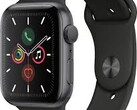Blood oxygen measurement is a trending feature among smartwatches and fitness trackers. It is found in devices such as the Amazfit Stratos3/Sports Watch 3, Honor Band 5i and Huawei Band 4 Pro, and may enable them to track this metric and report back on it to their users. These wearables estimate this oxygen level through the typical electronics technique of peripheral capillary saturation (or SpO2) estimation.
It seems that this function was also baked into many newer Fibit devices such as the Versa 2, but was never activated within their software. Now, however, the recently Google-acquired OEM has reversed this with new software.
This update adds a setting called Estimated Oxygen Variation to the Fitbit app. It can turn SpO2 data into a graph over time, which may alert users to potential health issues should it exhibit a sudden spike. This upgrade has been spotted in the US market to date, and may be rolled out to other regions soon.
In addition to the Versa series (which consists of the 1, 2 and Lite variants), this feature is compatible with the Fitbit Ionic and Charge 3 fitness trackers.

































